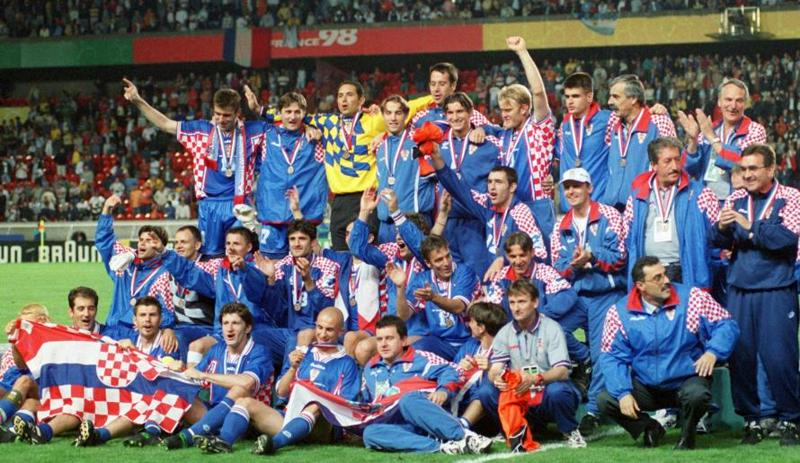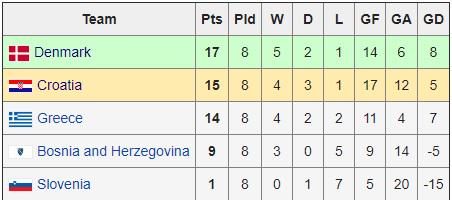After shocking Argentina Thursday night with a 3-0 result, the Croatian national team has qualified from the FIFA World Cup group stage for only the second time in history. The achievement will bring back memories of their first success in 1998 - a Cinderella story that saw the side eventually finish third.

Croatia made it to France by finishing second in their qualifying group behind Denmark and ahead of Greece. The race for the second place went down to the wire, with Croatia needing to beat neighbours Slovenia away from home during the final matchday and hope that Greece didn't beat Denmark at home. An early goal from Davor Šuker lifted the pressure off Croatia and they ended up winning 3-1, while Greece failed on their task, ending up playing out a goalless draw.

In France, Croatia shared a group with Argentina for the first time with Jamaica and Japan joining them. The start was easy with a 3-1 win over the Jamaicans, but only Šuker could find a way past the Japanese defence in the next outing as the match finished 1-0.
Ahead of the final matchday, Argentina and Croatia had already sealed qualification into the next round and met in a matchup to decide the group winner. Argentina, with current Atletico Madrid manager Diego Simeone as captain and the legendary Gabriel Batistuta leading the line, ended up as 1-0 winners. Left-back Mauricio Pineda scored the only goal of the game, finishing off a quick counter-attack.
The result meant that Argentina went on to face England in the Round of 16 and Croatia took on Romania, so the Croatian actually managed to get an easier opponent on paper. Šuker, who played for Real Madrid, was one of the deadliest strikers in Europe during the 90's and once again, Croatia had the luxury of relying on him to get a vital goal. He netted his third of the tournament via a first-half injury-time penalty and one goal was enough to win the game.
In the next round, Croatia had a daunting task - defending European champions Germany with all their old legends (Lothar Matthäus, Jürgen Klinsmann, Andreas Möller, Thomas Häßler) were the next opponents in the quarter-finals. Managed by Berti Vogts, who won the World Cup as a player in 1974, Germany had an easy ride at the beginning coming from a group which featured the USA, Iran and Yugoslavia, but they surprisingly almost crashed out in the first knockout stage, trailing Mexico 1-0 with 15 minutes to go before goals from Klinsmann and Oliver Bierhoff helped them turn the game around and win 2-1.
The performance against Mexico was a sign that Germany might be there for the taking, but nobody expected Croatia to completely romp them. Robert Jarni, who also joined Real that summer, opened the scoring in first-half injury time and Šuker alongside Valencia's Goran Vlaovic made it 3-0 in the second. Up to that point, reigning world champions Brazil were the only side that had managed to beat Germany since the start of the 1996 EURO tournament.
Šuker scored again in the semis against the eventual winners France, putting Croatia 1-0 up at the start of the second half, but Lilian Thuram of all people answered only a minute later and also ended up scoring a 2-1 winner for France later in the game. These were his only international goals for Les Bleus in 142 games. Talk about right timing.
It was a sad ending to Croatia's incredible run, but they could've already been happy with what they had achieved at the tournament, as the bookies had them down only as joint-twelfth favourites for the World Cup crown. Yet, the team managed by Miroslav Blaževic weren't done with that. Robert Prosinecki, who's currently in charge of the Bosnia and Herzegovina international team, opened the scoring against the Netherlands in the third-place playoff and Šuker (of course) ended up scoring the decisive goal in a 2-1 win, his sixth goal of the tournament which brought him the Golden Boot ahead of Batistuta and Italy's Christian Vieri.
Even though Šuker was only 30 and a lot of other key players like captain Zvonimir Boban were also at a good age, the team ended up missing the Euros in 2000 after Yugoslavia and the Republic of Ireland pipped them in qualification. They did manage to make it back to the World Cup in 2002 and have since then played at every European championships finals, but further success has eluded the nation. But maybe 2018 is once again their year. At least the Vatreni (The Blazers) are off to a great start.
Comments